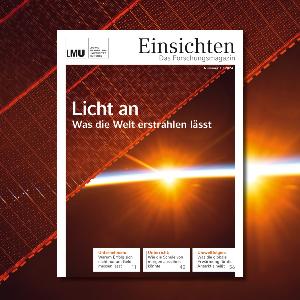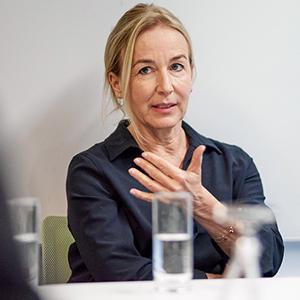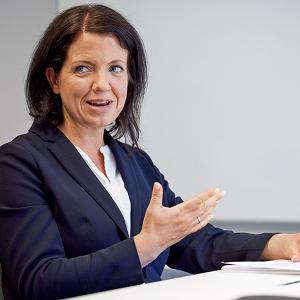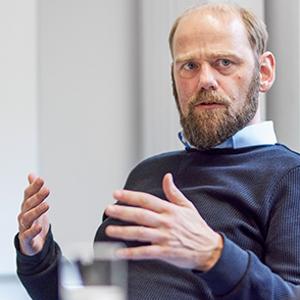The answer to the sad emoji
9 Sept 2024
How do we get German schools out of their rut? A discussion about the PISA shock, outmoded structures, updating teaching models – and teachers who want to change things. From the research magazine EINSICHTEN
9 Sept 2024
How do we get German schools out of their rut? A discussion about the PISA shock, outmoded structures, updating teaching models – and teachers who want to change things. From the research magazine EINSICHTEN
It is now 20 years since the PISA results sent shockwaves through Germany. Last year, they set off alarm bells once again. In mathematics, for example, the performance of 15-year-olds is more than a year behind the level of PISA 2018. And that is just the most prominent of the assessments, all of which cast an unflattering light on German schools. What is going wrong?
Katja Scharenberg: The findings of the latest PISA study from 2022, which were published at the end of last year, are not all that surprising. A downward trend was already apparent in PISA 2018, and this has continued down to the present.
Ludger Wößmann: In all assessments – IGLU, TIMSS, PISA, and so forth – the longer-term trend reads like a sad emoji. After the PISA shock in 2000, school performance in Germany continuously improved by a good margin: up to 70 to 90 percent of a school year. Since 2011/12, this trend has reversed – and quite markedly. Over the past four years alone, math performance has fallen by 25 PISA points, dropping below the level of 2000.
How should society react?
Wößmann: We actually need a new PISA shock to jolt the German educational system into recovery. We’re talking about the fundamental skills of mathematics, science, and reading comprehension, upon which everything else is based. Economically, this has a huge negative impact on prosperity. We calculated it: If the decline in PISA points is lasting, it will mean a loss in gross domestic product of 14 trillion euros. It cannot be stressed often enough that human capital is much more important than the machinery and equipment in a country. The educational attainments of the population are the most important factor behind long-term economic development processes.
Uta Hauck-Thum: Looking at economic, technical, and legal aspects is one thing. But neither should we forget the social and cultural changes that have taken place over the past 20 years with the progress of digitalization. This goes far beyond questions of equipment, rather we need to change teaching and learning processes. We need a new learning culture that enables children with vastly different starting positions to acquire the skills they need to deal with this new complexity. Heterogeneity is increasing, but curricula are not adapted to the changed media and communications practices of children, to their prior experiences. As a society, we’re clinging to the technological context and structures of the industrial age, as we have known them for 100 years.

Read more about highlights of research in the current issue of our LMU magazine EINSICHTEN at www.lmu.de/einsichten. | © LMU
We need a new PISA shock, you say. What would that achieve?
Wößmann: I have the feeling that, after a brief period of indignation, the phase of empty rhetoric is kicking back in. The topic doesn’t have the high priority it deserves in politics and society. This was not the case during the PISA shock, when many people were serious about not neglecting the core task of schools – the teaching of basic competencies – any longer. I don’t see that resolve now. Politicians are clearly more concerned about not creating a negative mood than in ensuring that children are actually prepared for life. I agree with you that how we do school no longer suits the times we live in, but we shouldn’t compromise on basic skills.
Hauck-Thum: Nobody wants that. It’s not about, say, downgrading the importance of reading competence with analog texts, but about expanding reading competence to encompass multimodal texts and further developing the teaching and learning settings accordingly.
Could you give an example?
Hauck-Thum: We’ve just finished evaluating a study on digital equality, which showed that reading motivation depends on the right fit. For example, girls with very poor reading skills were most likely to engage with texts through interacting with analog objects such as glove puppets. They acted out scenes with the puppets and this motivated them to read. Boys with average reading ability, by contrast, were less likely to be motivated to read in this analog setting, but more so when asked to interview the main character and shoot a video on a tablet computer. We also maintain a website at our partner schools which contains book recommendations by children for children (www.les-o-mat.de). By shaping the site, they can actively contribute to the digital world while at the same time improving their basic skills as they engage with the books. These two domains are often pitted against each other, but we need to promote them equally. The world of schoolchildren has changed, and the heterogeneity of children is continuously increasing. We need to respond to this.
In society, we have a fixed idea of school and lessons. Everyone has experienced school in one form or another. With this filter, it’s difficult to change processes of teaching, learning, and testing.Prof. Uta Hauck-Thum, Professor of Elementary School Pedagogy and Didactics at LMU.
Scharenberg: The student body was always heterogeneous – as regards the different learning conditions, for example the prior knowledge of children. But some things have also changed. The task of integration is quite different nowadays when dealing with children who have had to flee Syria or Ukraine. On top of cultural heterogeneity, there is social heterogeneity. Furthermore, the school system has changed over the past 15 years. Inclusion is the operative word: On the one hand, children and adolescents with and without special educational needs are learning together in inclusive settings in mainstream schools, whereas previously they were separated, for the most part, to different educational settings. On the other hand, special schools still exist, which turn creates new inequalities as students with special educational needs choose different places of education depending on their sociocultural background. Ultimately, these challenges filter down from the divided school structure at the level of the school system to the level of each classroom. In the end, it depends on how teachers handle diversity. And teachers don’t just have the job of conveying knowledge, but they also have to prepare schoolchildren for new societal challenges, such as dealing with and accepting diversity as well as global issues such as climate change and sustainable development.
Wößmann: I agree with you there, but sometimes I ask myself whether that’s so fundamentally different from 20 or 50 years ago. We had upheavals back then as well. Perhaps the changes today are more fundamental and much faster – and most of all maybe, the new media give them another dimension.
Hauck-Thum: We also have to consider what performance actually means today. Nobody doubts that we need a high-performance society. But the question here is what we are conditioning children for? For six grades? What does it mean anyway to get a three in a class test? It’s actually a strange form of feedback. At the end of fourth class, children have to sit test after test in class. Naturally, that does something to lessons. Testing culture determines learning culture and vice-versa. All children receive a wide variety of learning opportunities at schools. However, the probability that the children actually use these opportunities for their educational success is very, very different, depending on their individual socialization experiences and domestic support structures.
So, how can we give children more targeted support?
Wößmann: We must home in on early childhood support in particular. This is especially important for children from lower educational backgrounds. There is lots of extremely good research out there showing how much we can achieve in this way. Even if it’s only helping the parents get a daycare place for their little ones.
How can we improve our structures for promoting language acquisition?
Wößmann: In some federal states, every child has to do a language test at the age of four and a half, regardless of whether they’re in daycare or not. In Hamburg, for example, children who fail the test are required to attend language courses at school so they’re prepared when they start school proper at age six. We can get a good sense of how effective this is when we consider that Hamburg is the only German state whose PISA performance has not plummeted over the past decade.
Hauck-Thum: Testing is also being discussed in Bavaria, but only testing. What to do with the results remains an open question. However, testing does not make children smarter; we need competent people supporting children from daycare and kindergarten onward. Who is doing that? Elementary school teachers, who are already in short supply?
Another criticism leveled at the education system is that it produces a lot of “losers.”
Wößmann: Yes, but there are many things we can, or could, do to improve this. One example: We did a large research project on a mentoring program in schools in disadvantaged areas of Munich, whereby college students volunteered to help disadvantaged adolescents. The teenagers are 14 or 15 and are fed up with school. In the mentoring program, the students and the adolescents met up 1:1 once a fortnight, building a personal relationship. It’s about easing the transition to the job market or further education. And we saw that for really disadvantaged teenagers, who come from troubled neighborhoods, the effects are massive. One year later, they’re better at school, have improved social skills, and are more resilient. In general, they begin to think about their future: Three years after the mentoring, more than half of them had started an education or training program, twice as many as in the control group.
What scope for action do teachers have today? Where can they actually begin?
Hauck-Thum: I’m currently monitoring 22 elementary schools as part of a school development project called “CoTransform Freising,” where we’re trying to support comprehensive collaborations between all stakeholders. Concretely, up to five schools join forces to form a school family.
Who belongs to the school family?
Hauck-Thum: Principals, teachers, children, parents are all involved in these communities, along with the governing and supervising bodies. Regular meetings help the various stakeholders get to know and understand the needs at different levels. This is important. Because if the governing body, for example, doesn’t know how teachers work in the classroom, it might buy whiteboards and PCs that are not used and end up gathering dust. Step by step, we’re also trying to establish new testing formats, for which we need the support of the supervisory body. In addition, we jointly developed a reading concept with teachers that encompasses the monitoring of learning progress (levumi.de). Furthermore, we’re focusing on democratic learning to facilitate the participation of children from an early age – including through the selection of topics and preferred media. For example, there’s a fixed lesson slot set aside for projects, with teachers offering a range of projects for children to choose from – across different classes and years.
Wößmann: The big question, however, is how long it takes to implement such things on a broad scale. We already have a wonderful array of initiatives – some of which have been around on a small scale for decades. But all this always depends on the commitment of individual actors among teaching staff and school management. Whether an initiative actually catches on is ultimately a political question, or at least a question of governance. Surveys of learning progress can help here. Where do we stand with a particular concept, where are we making headway? And if the goal is sufficiently clear and there’s a certain degree of transparency in relation to how well we’re achieving the goal, we can give schools much more autonomy.
First and foremost, we need greater societal recognition of the teaching profession.Prof. Katja Scharenberg, Chair of Research on Education and Socialization at LMU
Teachers are being asked to look after inclusion and digitalization. They are expected to deal with social divides and their heterogeneous charges. Are they equipped to handle all these challenges? Or do we need more social workers and psychologists at schools?
Scharenberg: First and foremost, we need greater societal recognition of the teaching profession. Of course, teachers also need skills in identifying and supporting a wide variety of different types of students, which certainly has changed a lot in recent times. And that is precisely our task in teacher education – and an opportunity to intensively prepare student teachers[KS1] to deal with diversity. I’m not just thinking of performance-based outcomes of schools and classrooms, but also about fostering the social skills of schoolchildren and promoting social cohesion in the classroom.
The federal government’s new ‘Startchancen’ program is designed to deal with such challenges. What can it achieve?
Wößmann: Although the program will not be a game changer, the approach is absolutely the right one. This is the first time we have a program that targets genuinely disadvantaged schools and sets out to financially support them. This was largely absent in Germany before now. But if we look at the whole political process, I’m afraid the program will just be a drop in the bucket in most areas. Quite frankly, it annoys me that in the to-and-froing between federal and state governments, the focus tends be mainly on questions of allocation and less about finding the best way to help children and adolescents.
How can we do better here?
Wößmann: First of all, we need to clearly define what constitutes a “challenging situation,” the decisive funding criterion for schools. It would be relatively easy to do that with precision. But even then, the allocation process can get mired in bureaucracy. We know that from the government’s digital pact for schools. We need to think from the standpoint of what actually benefits the children and adolescents.
Hauck-Thum: But the difficulties with the digital pact were not just down to bureaucracy, but also because some schools struggled to develop media concepts due to not having engaged with the topic much beforehand. It’s certain now that the money from the ‘Startchancen’ program will come. It will be up to 250,000 euros per year for each eligible school. But what will they do with the money? You can use it for quite different things. You can renovate toilets, which is certainly not unimportant for children in terms of wellbeing. But schools should also consider – supported by research – which concepts are effective for increasing the chances of all children to have educational success. External partners should be firmly integrated into multi-professional teams. Our school family concept aims to do precisely that.
Whether good approaches actually catch on is ultimately a political question, or at least a question of governance.Prof. Ludger Wößmann, Chair of Economics & Economics of Education at LMU
Isn’t it true that changes like the digital pact always take a long time?
Wößmann: I don’t suppose there’s a genuine interest in leaving everything as it is. But naturally, any change that not everyone embraces wholeheartedly is going to be laborious. And then when we have different people who want different things, things can quickly grind to a halt.
Hauck-Thum: In society, we have a fixed idea of school and lessons. Everyone has experienced school in one form or another. With this filter, it’s difficult to change processes of teaching, learning, and testing. Moreover, trainee teachers often experience little new during their studies, particularly when it comes to internships. And implementing structures derived from theory remains a tall order for most people.
How do you propose making the profession more attractive?
Hauck-Thum: Yes, how do we induce students to become teachers who have the confidence to change the school system? We’re trying to offer students a wide range of inspiring seminars at university, so that they can have practical experiences with new teaching and learning settings. In addition, we urgently need administrative support at schools. Important steps would include reducing the hours of teachers instead of increasing them, timetabling fixed cooperation sessions, focusing more on multi-professional teams, initiating cross-stakeholder exchange processes, and establishing permanent collaborations with learning institutions outside of the school system. This would not only change the work itself, but also as the image of teachers in society. As a result, more creative young people would enter the profession with the desire to forge new paths in cooperation with others. Only with open, agile, motivated young people who are ready for the work of transformation can we restructure our education system – people who no longer reproduce what they experienced during their own schooldays.

Prof. Uta Hauck-Thum is Professor of Elementary School Pedagogy and Didactics at LMU. She studied elementary school teaching at the University of Augsburg, and after passing the state teaching examinations, she worked as an elementary and middle school teacher in Munich for eight years. Hauck-Thum was a research associate at the Chair of German Language and Literature Education at LMU, where she also worked as a lecturer after completing her doctorate. Subsequently, she took up a position at Salzburg University of Education before returning to LMU in 2018. Photo: Stephan Höck / LMU

© LMU/Stephan Höck
Prof. Katja Scharenberg is Chair of Research on Education and Socialization at LMU. She studied sociology at the University of Cologne and at the University College London. She obtained her doctorate in educational science at TU Dortmund University, where she also completed her habilitation degree. She worked as a senior researcher at the Universities of Basel and of Bern and as a tenure-track professor of inclusion and heterogeneity at Freiburg University of Education. Her most recent position at the latter was as Chair of Educational Sociology, before taking up her appointment at LMU in 2023. Photo: Stephan Höck / LMU

Prof. Ludger Wößmann is Chair of Economics & Economics of Education at LMU and Director of the ifo Center for the Economics of Education at the ifo Institute in Munich. Wößmann studied economics at the University of Marburg, the University of Kent at Canterbury, and in the Advanced Studies Program of the Kiel Institute for the World Economy at Kiel University, where he subsequently worked in the Human Capital and Growth research group. Wößmann obtained his doctorate at Kiel University and completed his habilitation degree at the Technical University of Munich (TUM). He is also a distinguished visiting fellow at the Hoover Institution in Stanford University. Photo: Stephan Höck / LMU
Read more articles from "EINSICHTEN. Das Forschungsmagazin" in the online section and never miss an issue by activating the magazine alert.